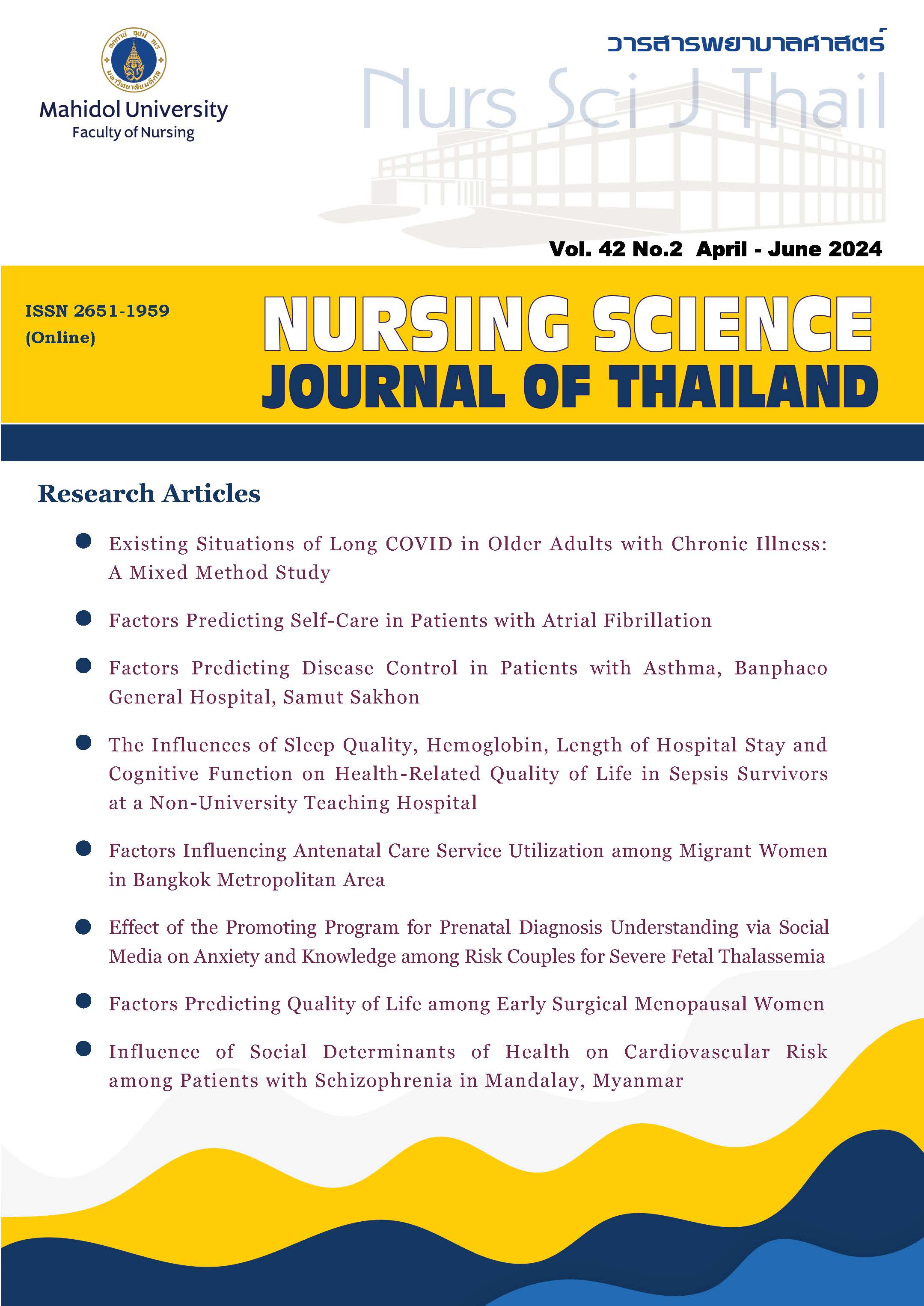The Influences of Sleep Quality, Hemoglobin, Length of Hospital Stay and Cognitive Function on Health-Related Quality of Life in Sepsis Survivors at a Non-University Teaching Hospital
Main Article Content
Abstract
Purpose: To study the influences of sleep quality, hemoglobin, length of hospital stay and cognitive function on health-related quality of life in sepsis survivors.
Design: predictive correlational research design.
Methods: The sample consisted of 102 post-sepsis patients aged 18 years old and above admitted to the internal medicine ward of a non-university teaching hospital. Data were collected by using 1) the records form of personal information and history of illness of sepsis survivors, 2) the EuroQol 5-Dimension 5-Level for the assessment of quality of life, 3) the Veran & Snyder-Halpern Sleep Scale and 4) the Thai Mental State Examination. The data were analyzed by using descriptive statistics & multiple regression analysis.
Main findings: The sepsis survivors had moderate health-related quality of life at = .55 (SD = 0.39). Multiple regression analysis revealed that all of the independent variables could account for 50% of the variance explained in health-related quality of life in sepsis survivors (adjusted R2 = .50), whereby sleep quality was the factor best able to predict health-related quality of life in sepsis survivors (
= .49, p < .001), followed by cognitive function at (
= .31, p < .001).
Conclusion and recommendations: Sleep quality and cognitive function have been found as significant predictors of health-related quality of life in sepsis survivors. This study supports the significance of the assessment of sleep quality and cognitive function in sepsis survivors which leads to develop nursing programs for recovery and promotion of quality of life among sepsis survivors.
Article Details

This work is licensed under a Creative Commons Attribution-NonCommercial-NoDerivatives 4.0 International License.
Copyright Notice: Nursing Science Journal of Thailand has exclusive rights to publish and distribute the manuscript and all contents therein. Without the journal’s permission, the dissemination of the manuscript in another journal or online, and the reproduction of the manuscript for non-educational purpose are prohibited.

Disclaimer: The opinion expressed and figures provided in this journal, NSJT, are the sole responsibility of the authors. The editorial board bears no responsibility in this regard.
References
Evans L, Rhodes A, Alhazzani W, Antonelli M, Coopersmith CM, French C, et al. Surviving sepsis campaign: international guidelines for management of sepsis and septic shock 2021. Intensive Care Med. 2021;47(11):1181-247. doi: 10.1007/s00134-021-06506-y.
Rudd KE, Johnson SC, Agesa KM, Shackelford KA, Tsoi D, Kievlan DR, et al. Global, regional, and national sepsis incidence and mortality, 1990-2017: analysis for the global burden of disease study. Lancet. 2020;395(10219):200-11. doi: 10.1016/S0140-6736(19)32989-7.
Strategy and Planning Division, Department of Health, Ministry of Public Health. Public health statistics A.D. 2018 [Internet]. Nonthaburi: Department of Health, Ministry of Public Health; 2019. [cited 2020 Jan 5]. Available from: https://www.dohdatacenter.anamai.moph.go.th. (in Thai).
Shankar-Hari M, Harrison DA, Ferrando-Vivas P, Rubenfeld GD, Rowan K. Risk factors at index hospitalization associated with longer-term mortality in adult sepsis survivors. JAMA Netw Open. 2019;2(5):e194900. doi: 10.1001/jamanetworkopen.2019.4900.
Apitzsch S, Larsson L, Larsson AK, Linder A. The physical and mental impact of surviving sepsis a qualitative study of experiences and perceptions among a Swedish sample. Arch Public Health. 2021;79(1):66. doi: 10.1186/s13690-021-00585-5.
Singer M, Deutschman CS, Seymour CW, Shankar-Hari M, Annane D, Bauer M, et al. The third international consensus definitions for sepsis and septic shock (Sepsis-3). JAMA. 2016;315(8):801-10. doi: 10.1001/jama.2016.0287.
Huang CY, Daniels R, Lembo A, Hartog C, O'Brien J, Heymann T, et al. Life after sepsis: an international survey of survivors to understand the post-sepsis syndrome. Int J Qual Health Care. 2019;31(3):191-8. doi: 10.1093/intqhc/mzy137.
Royal Institute of Thailand. Dictionary A.D.1999. 4th ed. Bangkok: Aksorn; 2003. 1436 p. (in Thai).
Nannan Panday RS, Minderhoud TC, Chantalou DS, Alam N, Nanayakkara PWB. Health related quality of life in sepsis survivors from the prehospital antibiotics against sepsis (PHANTASi) trial. PLoS ONE. 2019;14(10):e0222450. doi: 10.1371/journal.pone.0222450.
Wilson IB, Cleary PD. Linking clinical variables with health-related quality of life. A conceptual model of patient outcomes. JAMA. 1995;273(1):59-65.
McKinley S, Fien M, Elliott R, Elliott D. Health-related quality of life and associated factors in intensive care unit survivors 6 months after discharge. Am J Crit Care. 2016;25(1):52-8. doi: 10.4037/ajcc2016995.
Alexopoulou C, Bolaki M, Akoumianaki E, Erimaki S, Kondili E, Mitsias P, et al. Sleep quality in survivors of critical illness. Sleep Breath. 2019;23(2):463-71. doi: 10.1007/s11325-018-1701-z.
Fleischmann-Struzek C, Rose N, Freytag A, Spoden M, Prescott HC, Schettler A, et al. Epidemiology and costs of postsepsis morbidity, nursing care dependency, and mortality in Germany, 2013 to 2017. JAMA Netw Open. 2021;4(11):e2134290. doi: 10.1001/jamanetworkopen.2021.34290.
Wouters HJCM, van der Klauw MM, de Witte T, Stauder R, Swinkels DW, Wolffenbuttel BHR, et al. Association of anemia with health-related quality of life and survival: a large population-based cohort study. Haematologica. 2019;104(3):468-76. doi: 10.3324/haematol.2018.195552.
Rabin R, de Charro F. EQ-5D: a measure of health status from the EuroQol Group. Ann Med. 2001;33(5):337-43. doi: 10.3109/07853890109002087.
Pattanaphesaj J. Health-related quality of life measure (EQ-5D-5L): measurement property testing and its preference-based score in Thai population [dissertation]. Bangkok: Mahidol University; 2014. 180 p. (in Thai).
Snyder-Halpern R, Verran JA. Instrumentation to describe subjective sleep characteristics in healthy subjects. Res Nurs Health. 1987;10(3):155-63. doi: 10.1002/nur.4770100307.
Rojjanakitti P. Relationships between personal factors, environmental factors and sleep quality in surgical patients after operation [master’s thesis]. Bangkok: Chulalongkorn University; 2001. 123 p. (in Thai).
Poungvarin N. Loss of cognition in the elderly. Siriraj Medical Journal. 1993;2(46):139-49. (in Thai).
Mostel Z, Perl A, Marck M, Mehdi SF, Lowell B, Bathija S, et al. Post-sepsis syndrome - an evolving entity that afflicts survivors of sepsis. Mol Med. 2019;26(1):6. doi: 10.1186/s10020-019-0132-z.
Jung SM, Kim YJ, Ryoo SM, Kim WY. Relationship between low hemoglobin levels and mortality in patients with septic shock. Acute Crit Care. 2019;34(2):141-7. doi: 10.4266/acc.2019.00465.


